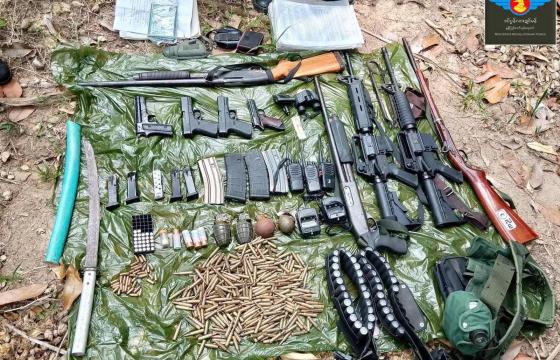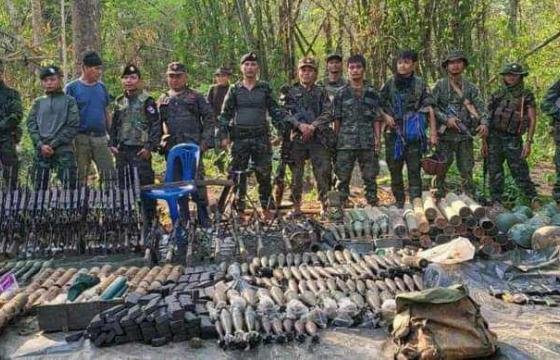Over three years have elapsed since the Military Council staged the coup, yet armed conflicts are still gaining momentum across Myanmar. Instead of diminishing, the space for political dialogue is shrinking, while military confrontations escalate. The Junta 's reliance on weapons to address political issues has led to significant military setbacks, leaving them at an impasse with no apparent political resolution in sight.
On February 10th, the Junta announced the activation of the conscription law, which had been enacted more than a decade ago, but had never been put into practice. As a result, the number of people leaving the country has increased dramatically, and there has been a huge negative impact on the country's economic and social sectors. The already dire problems of inflation, high prices, and unemployment have become exponentially worse.
The brutal rule of the Junta has fueled hardships across all sectors, the plunging the population into poverty. Myanmar, under the Junta's rule, is gravitating towards a state devoid of freedom, riddled with corruption, and heading towards being a failed state.
Under the Junta's rule, Myanmar is steadily descending into a state of dysfunction Only with the complete dismantling of the military dictatorship can pave the way for the eradication of such oppression and misery once and for all.
Myanmar's Education: Facing Imminent Threats
One sector profoundly affected by the Junta's conscription law is education. While the law exempts those below 18 years of age, university students pursuing higher education are directly threatened by its provisions.
The Junta has announced plans to conscript military personnel from diverse sectors, including university graduates. Under this decree, individuals designated as professionals due to their university education are compelled to serve in the military for an extended duration. As a consequence, university students find themselves bewildered and uncertain about whether to pursue further education.
"I have to attend the final year now. Though I have enrolled, I am still uncertain about attending university this academic year. Given that I am in my final year, not attending would pose a significant loss for me”, a distance education student from Mawlamyine told Rehmonnya Institute for Civic Engagement (RICE).
The conscription law permits a temporary suspension from the military draft for those currently pursuing education, albeit without complete exemption. However, once the suspension period ends upon completing education, military service becomes compulsory. Concurrently, the Military Council has intensified airstrikes, specifically targeting schools in ethnic regions.
In a notable incident, a Junta aircraft bombed two schools in Demoso Township, Karenni State in a single day, on February 5th. In Daw Si Ei village, a secondary school attended by approximately 200 students was toppled by the bombs, resulting in the tragic loss of four students' lives and injuring 29 others.
"I have decided not to send my children to school until the revolution is successful. I am going to keep them at home. That is the only way I can avoid worrying”, a parent from Karenni State told Kantarawaddy Times, a local media outlet.
Following the school bombing, the Military Council propagated false information, claiming that the deceased were People's Defense Force (PDF) fighters, not children. This blatant misinformation strongly suggests that the schools were deliberately targeted by the Junta.
Furthermore, the Junta's Air Force has been indiscriminately bombing residential areas, prompting even agencies affiliated with major organizations like the United Nations (UN) to paint logos on the roofs of their office buildings as a defense measure against airstrikes. As long as the Junta remains in power, the education sector in the country will continue to suffer.
Karenni State's Health Sector Faces Numerous Hardships
Since the onset of the coup in 2021, Myanmar's health sector has experienced a significant decline over the span of more than three years.
Myanmar endured successive waves of Covid, with the first hitting in September 2020, followed by the second in June 2021, and the third in March 2022, during which time the population experienced a deprivation of fundamental healthcare rights.
In December 2023, the Ministry of Health under the Junta reported the detection of cases of respiratory disease attributed to the JN.1, Omicron variant coronavirus infection within the country.
Nonetheless, the Junta-controlled ministry has never disclosed an exact tally of infections. Media reports suggest that this month alone, there have been over 500 cases of respiratory illness reported in the densely populated Karenni refugee camp No. 1.
Situated in Mae Hong Son District in Thailand, the refugee camp provides shelter to approximately 10,000 people displaced by war. With the junta's blatant neglect of public healthcare, refugees rely heavily on support from neighbouring countries.
The Junta's priority has consistently been maintaining power, rather than addressing public healthcare needs. Furthermore, it has obstructed the transportation and sale of essential drugs for diseases like malaria, tuberculosis, cholera and HIV, citing security concerns.
Amidst a myriad of crises including conflicts, political instability, transportation disruptions, and more, the fundamental health rights of the people will continue to be eroded, with the prospect of worsening conditions looming ahead.
Struggles Faced by War-Displaced Individuals in Dawei
As the Military Council encounters ongoing setbacks both politically and militarily, it has escalated air raids in recent months, exacerbating the plight of war refugees. With stringent restrictions on the transportation of food and medicine, displaced individuals are grappling with livelihood crises on top of the impacts of conflict.
In the Ahshaetaw area of Dawei Township, located in the Tanintharyi Region, clashes between Junta troops and resistance forces frequently erupt, prompting locals to flee their homes.
On February 16th, the Karen National Liberation Army (KNLA) and local resistance forces ambushed a 300-strong Military Council convoy traveling along the Dawei-Htikhi Road, leading to intense fighting.
Since then, conflicts have reignited in the region, with Junta troops intentionally firing small arms and artillery into residential areas, forcing the evacuation of over 3,000 residents from villages including Wakone, Thingantone, Kyaukmetaung, Bawapin, Latekye, Pyaung, Thayetngote, and Paket. These displaced individuals have to seek shelter in nearby forests and orchards.
As a result of the Junta's shelling, homes, religious structures, farms, and workplaces have been destroyed, and numerous livestock have perished. As a consequence, war-displaced individuals are grappling with issues such as food and housing shortages, urgently requiring assistance, aid workers said.
Simultaneously, due to the Junta's unjust prohibition on transporting medicines to the Ahshaetaw area, locals are encountering significant hardships in accessing healthcare.
Furthermore, over the past few years, the Junta has imposed a ban on the transportation of rice, dry food, and warm clothing into Ahshaetaw, aiming to suppress resistance forces operating there.
As a result of the Junta's severe blockade, the social conditions of Ahshaetaw residents are deteriorating rapidly, highlighting the urgent need for assistance to ensure their basic sustenance.







